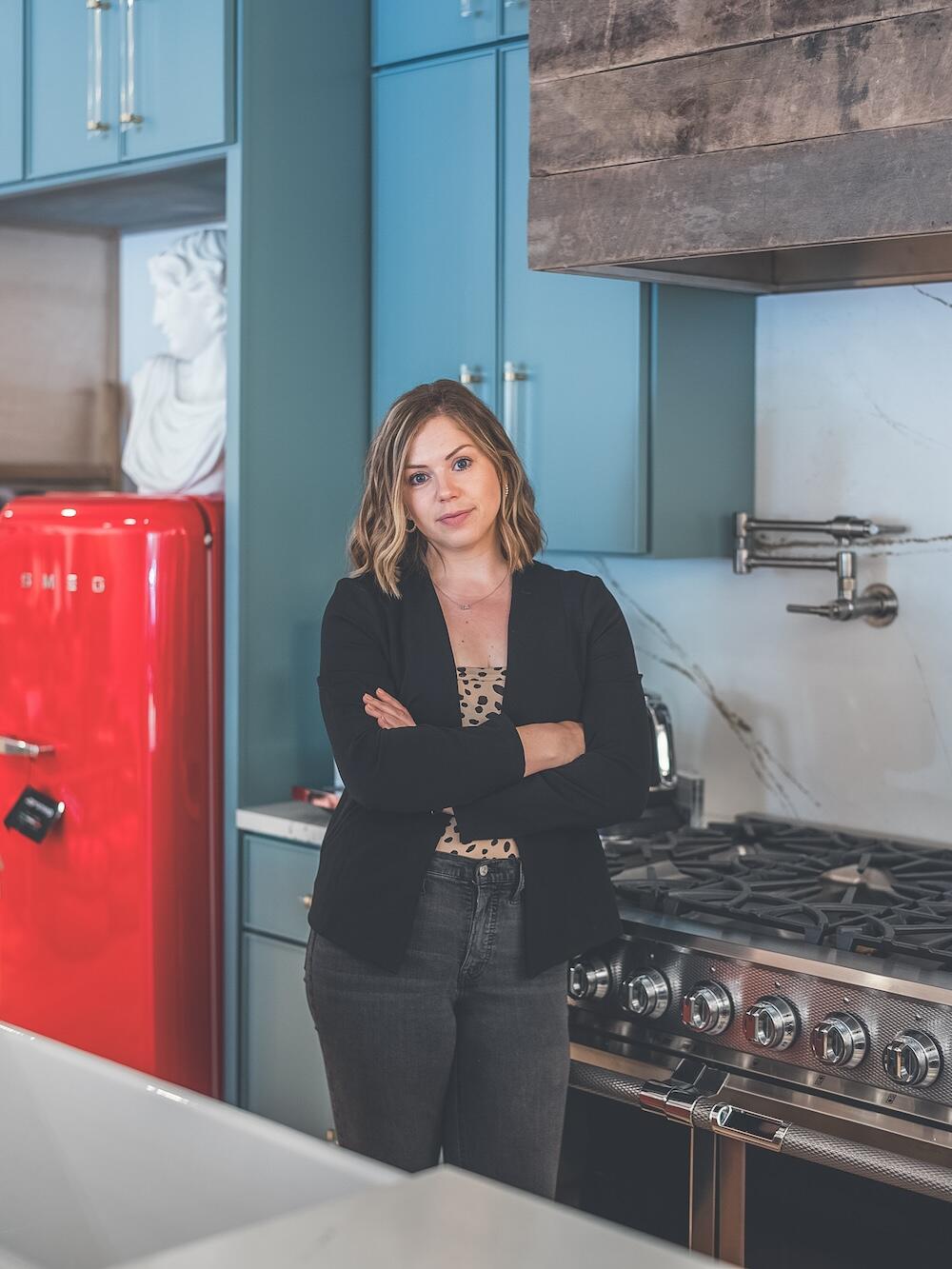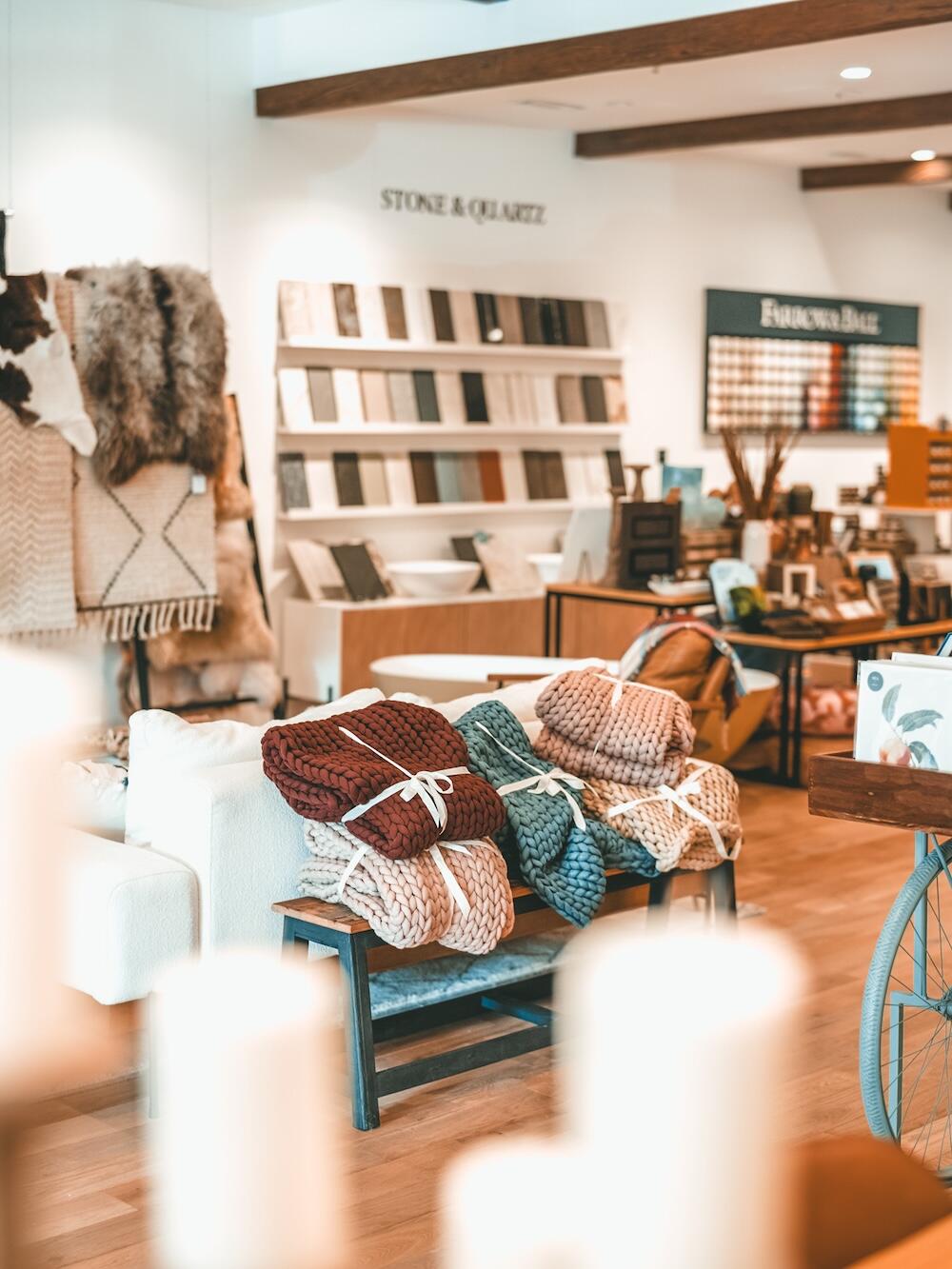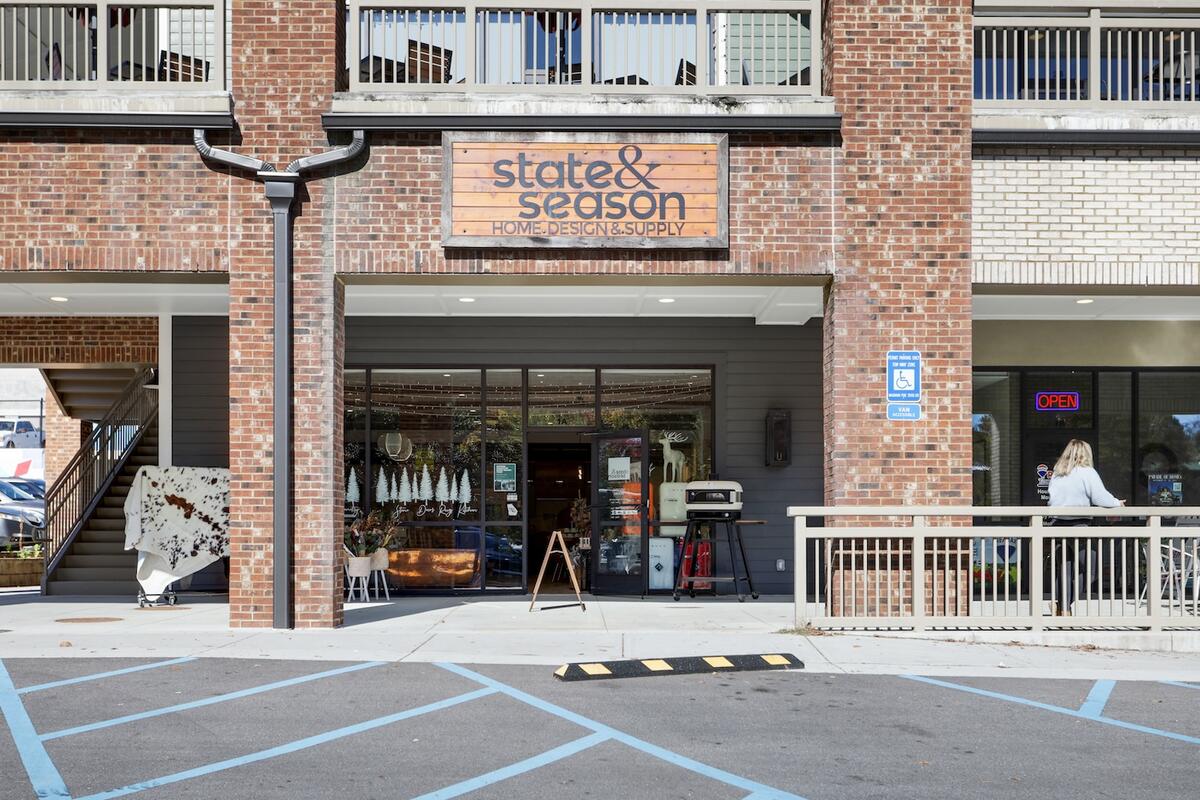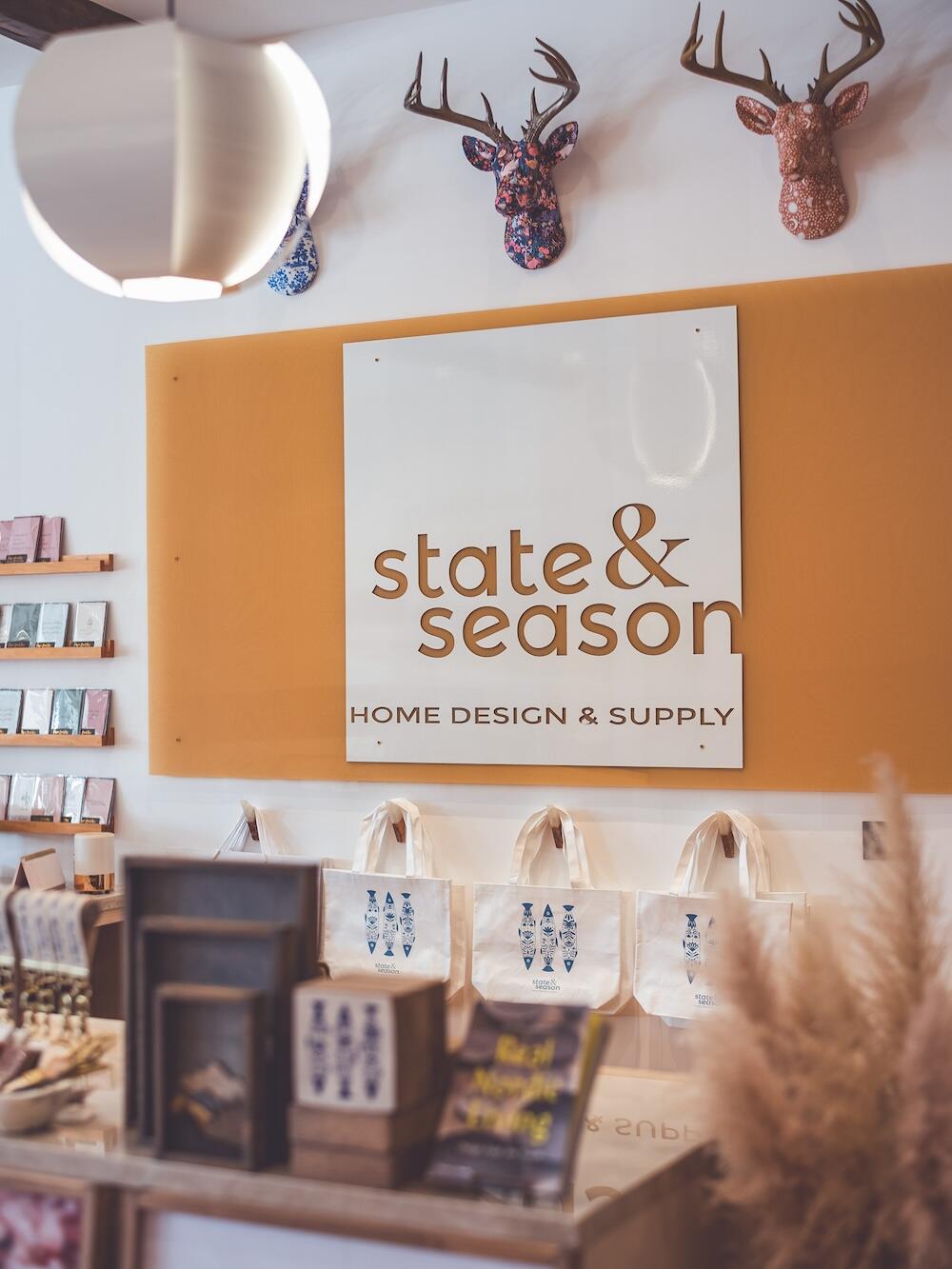In Business of Home’s series Shop Talk, we chat with owners of home furnishings stores across the country to hear about their hard-won lessons and challenges, big and small. This week, we spoke with Lucy Small, the founder of State & Season in Blue Ridge, Georgia.
Small has been ahead of the curve more than once in her career. She got her start in tech in 2007, becoming a digital nomad as she moved among America’s biggest cities. A few years ago, she finally settled in her mountain home, attracted—as many others would soon be—by small-town life. Blue Ridge now holds the second-fastest growing ZIP code in the state; located 90 miles north of Atlanta, it’s also a perfect weekend getaway for hiking and camping. For all those new homeowners and visitors, Small offers State & Season, a custom interior design and home supply business and high-end retail showroom. Ahead, she discusses her choice to only offer the best of the best, why it’s not hard to convince customers about luxury product, and the frustrations of mountain logistics.

What was your career like before the shop?
I worked for tech companies and advertising agencies, focusing on user experience design, campaign design and marketing. I was always the nontechnical hire in a technical company or the first technical hire in a nontechnical company. I graduated in 2007, when the online world was taking off for a lot of companies. As a marketer, typically, you are a good salesperson, and the best salesperson really believes in what they’re selling. That’s carried through with me. I really do believe in what I’m doing here.
So, how did the career switch to this business and store come about?
It was largely a response to a need, which I think is the best way to start a business. We had gone through the house-building process, and were always meeting people going through it and helping them. It really became clear that this [business] would be such a benefit. For a while, I didn’t want to have a physical location, because I was able to do what I do without one. It’s a ton of work—a lot of research, buying, logistics. A lot of expense.
But it’s so amazing how people really get it when they walk in. I had somebody come in the other day who was like, “So, you have everything I need for the whole home in one place, and I don’t have to drive around and deal with salespeople?” And I was like, “Exactly.” I ended up being the only showroom to carry some of these brands in 200 or 300 miles. It definitely resonates with the people who know.
Can you tell me a bit about your geographical journey—where you grew up and how you got to this area of Georgia?
I’m from Toronto. It’s a great place, a very multicultural space, but I always felt the need to go and do something different. I got jobs that took me all over the U.S.: New York, Atlanta—I was in San Francisco when I met my husband, who lived in Washington, D.C., so I moved there for a little while, in the depths of winter. When our lease was up, we moved to Miami. I was working on my career, and my husband was working from home, so it didn’t really matter where we were. We took a road trip through Virginia and North Carolina into Georgia, stopping in all the small towns. It was a lot of research.
My whole thing is that you can have it all living in the country. You don’t have to be in this urban rat race. And Covid really expedited that for a lot of people. It drove people to rural areas, just like it did for us.

What is the vibe of your store?
There are a few different kinds of rustic: a very specific Texas aesthetic, a specific Montana aesthetic, a specific upstate New York aesthetic. And for a very long time, there was a specific Appalachian aesthetic, which is like bears, pine trees, logs and stuff like that. My personal aesthetic was a lot more modern. That led me to more of a Scandinavian style. The Appalachian aesthetic is warm, warm, warm: yellow wood, yellow pine stairs, yellow walls, yellow ceilings, just everything wood. What Scandinavian design offers is a rustic aesthetic that has a lot more contrast.
What kinds of vendors do you work with?
My philosophy in having 2,000 square feet, which is a lot less than your typical 30,000-square-foot industrial-size showroom, is two things: I want to show products that I really believe in—the best of the best—and I want to show products that are relatively few in number. You have relatively few options but they can be customized endlessly. So, in a really small amount of space, I can show the best of what a vendor has to offer.
For example, one of my vendors is Farrow & Ball. They have 140 colors. It’s not Sherwin-Williams, where you have thousands upon thousands of colors and they can color-match anything. While that might be limiting to some, every color has its own kind of personality. It’s a richer selection process, where you’re not just saying, “I want green,” but you’re actually picking a moment in time where that green is from. They have very midcentury green, Victorian green. Their paint is mixed and made in the U.K. and shipped to me in a gallon can; I don’t have a paint mixer in the store. It’s the best paint on the market, period. I have never had someone I’ve given Farrow & Ball to want to go back to another brand. If they do, it’s a matter of budget. I have another vendor, California Faucets. [I think] they are the best plumbing fixtures in the country. It’s all solid brass. People come in and say, “Well, my builder recommended this brand, and it seems fine.” I let people hold a California Faucets product in one hand and the competitor brand in the other, and they’re like, “Oh, yeah. I see the difference.”
Is any of your customer base to-the-trade?
We do a little bit with trade, especially when they find us through our vendors. Even though I’m in Georgia, I’m closer to Chattanooga than Nashville is, so the Chattanooga market comes to our little town to shop because I’m the only one who has these brands.
What’s the category or product that flies off the shelves?
For me, at holiday time, it’s candles. We [also] sell a lot of cowhides, which we bring in from Brazil. They’re not like your Georgia dairy cows. We sell a lot of sheepskins, a lot of higher-end knives and cutting boards. And that gives me the opportunity to buy from a lot of local vendors; there are local people making cutting boards with epoxy or stuff like that. It’s really a mix. During the holidays, our town is so inundated with tourism that we have really big sales days, with all sales under $100.

What about your own favorite category?
I love high-touch items, the things you interact with every single day. Those are really the places where I like to spend money—like countertops. You can get the same look at a variety of price ranges. Terrazzo, I think, is a beautiful countertop, and it’s like a third of the price of quartz, but not everyone likes it. You can still get something really interesting and true to your personality, but it doesn’t have to be expensive.
I sell Hestan, which was formerly a commercial-only restaurant brand. Same with True refrigerators. Sometimes, people get caught up in thinking, “Well, I need all my appliances to come from one place.” No, you want all your appliances to be good. You want all your appliances to be the best. These things don’t just look good in a picture for five seconds, which is really what a lot of home design has moved to—something that looks good in a photo online.
I think the common misperception is that things only cost more for the brand [name rather than the quality]. A lot of people think that, and maybe it’s because of mass retailers and some appliance companies that really do trade on their name, then you get their product and it’s made in China and half-broken. In my store, I can justify the price on every single item. Sure, sometimes things are out of people’s budgets, but I’ve never heard “That’s not worth it.”
What is your approach to sourcing?
It’s a mix. I’m in a tourist area where there are a lot of little shops. What’s always been important is not having the same stuff that everybody else has; there’s no point in me having something that another gift store has, or something that Home Depot has. I can’t compete with Home Depot. From the very beginning, my philosophy was to find those unique things that I would want in my own home because, again, I’m best at selling something when I really believe in it. I can’t sell something that I think is crappy.
The reason I moved to sourcing from places like Faire was because when I joined, they had promotions with no shipping fees on anything from Europe. From Europe! That was an easy way for me to get away from having the same product that everybody else had, to source things from overseas. I still do—a lot of my sheepskins come from Iceland or Finland or Denmark through platforms like Faire. That’s where I started sourcing my reindeer hides, which are super popular as well.
Regarding the brands I sell for actual home building and renovation, it’s been a lot of research and experimentation. If I’m going to install this in somebody’s home, I need to stand behind it. And a lot of it is driven by sales reps—because honestly, there have been many brands I’ve wanted to work with that by all accounts wanted to work with me too, but the rep was unresponsive, would disappear, or didn’t provide pricing. Companies will hedge their bets by not investing in reps and instead try to market to people directly on their website. It’s stuff like that that keeps me from being able to work with a company.
Do you think that there are any potential prejudices about your area, that maybe reps think it’s not worth selling to you?
I don’t think it’s that at all. I think a rep that’s crappy to me is crappy to everyone. It’s about a company just not wanting to put focus there. That’s a big deal for me, because when you’re doing a home supply purchase, it could be $10,000 to $50,000. And if something goes wrong with shipping, if the product is damaged, I need to know that I have a responsive person who cares.

What are some challenges of operating in your area?
The biggest challenge is that everyone wants to deliver things in freight trucks, and we don’t have roads that can accommodate freight trucks up here. Nineteen out of 20 clients will be up a gravel road on a mountain somewhere. So, logistics is a big part of the problem. I have to pay for warehouses, I have to pay for trailers, I have to pay for movers. It’s a whole infrastructure system to get people their stuff, basically. And it’s not the brand’s problem; they’re going to drop it off on the curb.
However, when I think back to Miami, it was nearly impossible to deliver anything for totally different reasons: There, you literally can’t park a truck, and you need a certificate of insurance just to set foot in a lot of neighborhoods. Condos require a monthlong advance notice when you need a service elevator. So every area is challenging.
What’s your favorite day as a shop owner?
I like busy days when there’s a ton of people in. I’m an extrovert. Rude customers don’t faze me. It’s so validating to see people approve of your choices, because everything in the store was my choice. Everything in the store was something that I liked and that I had faith somebody else would like. Anytime somebody makes a purchase, that’s basically what they’re saying: “Yes, you were right. I like this.”





























